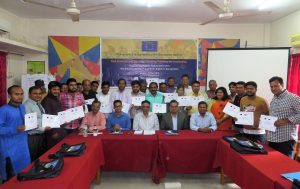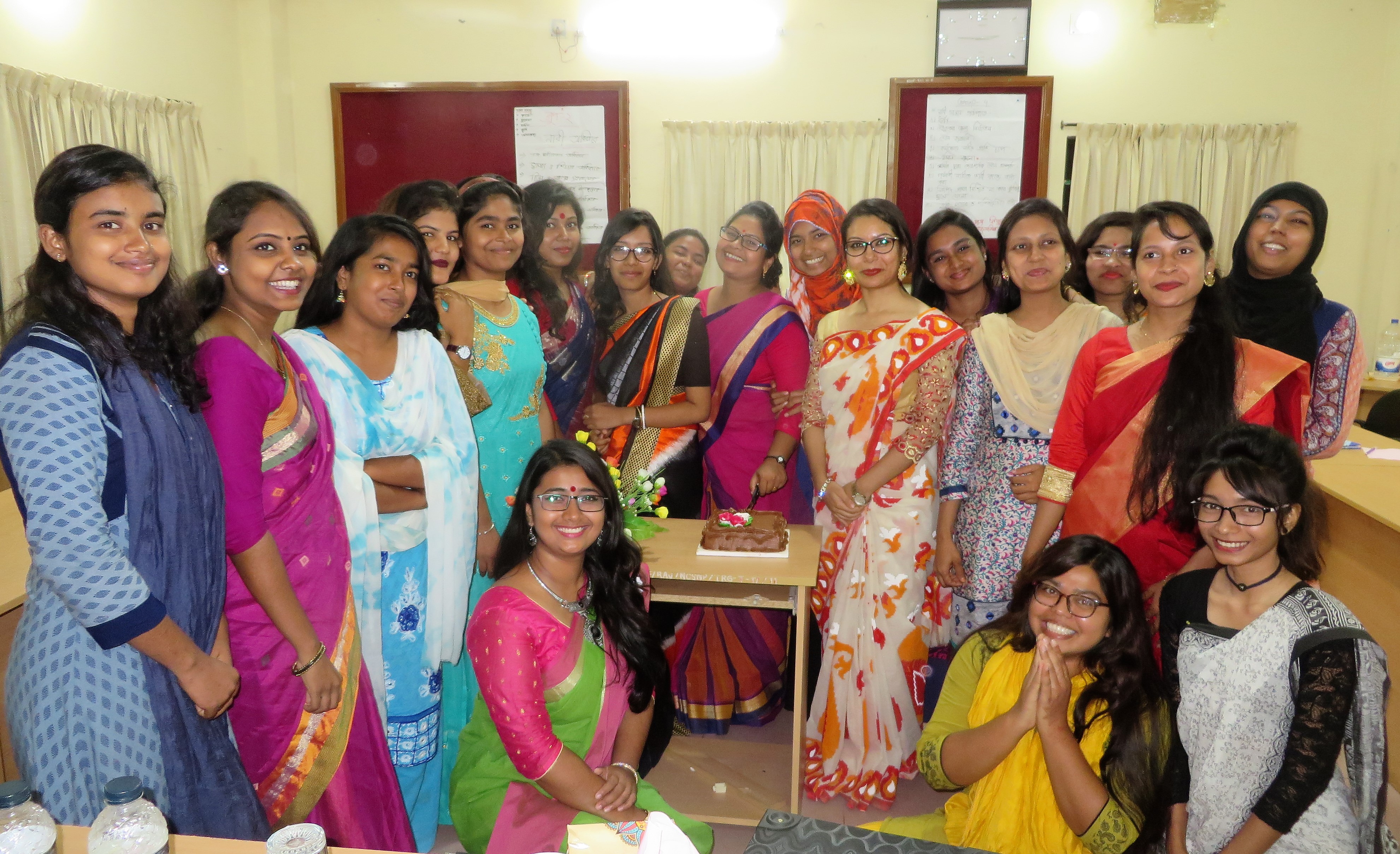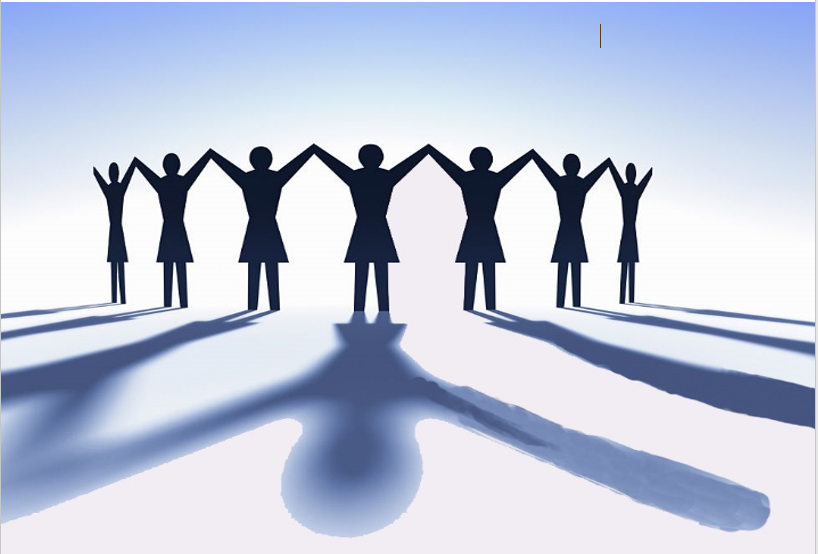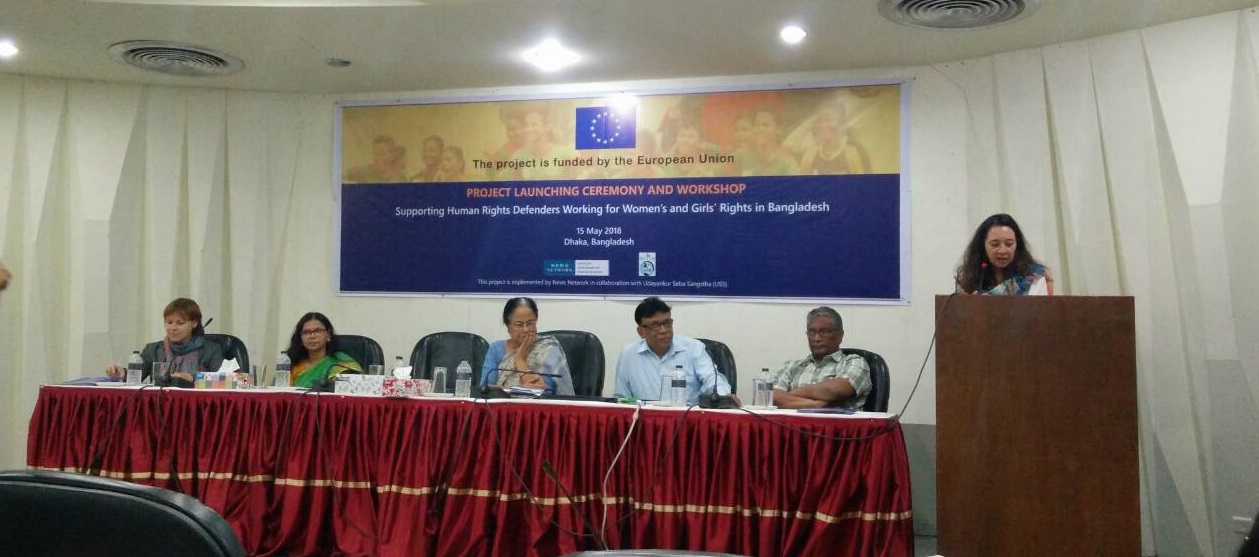Risk Analysis and Security Planning Training for Journalists

News Network with the support from European Union has organised several training programmes on professional risk analysis and security planning for news reporters and media gatekeepers, including editors, executive editors and news editors. The issue of safety for journalists is a major concern and the risks factors are likely to increase as the country approaches to a national election. Most journalists were not well aware of their safety issues and many of them took part in such trainings for the first time. Its aims were to raise understanding on risk, safety and security of journalists so they can protect themselves against violence, attack, threats and actions. Around 200 news reporters, working for local and national print and electronic media and 40 local media gatekeepers were trained under the programme. The trainings were held in Rangpur, Dinajpur, Satkhira and Jashore from September to November 2018. #JournalistsRiskAnalysisSecurityPlanning
Fellowship for Female Journalists on Human Rights Journalism

In order to encourage women to take journalism as their profession and contribute towards protection of human rights, News Network has been implementing a four-month fellowship programme on Human Rights Journalism in Rajshahi. Additional Divisional Commissioner of Rajshahi Division Md. Aminul Islam inaugurated the programme on 5 August 2018. Twenty potential young women have been awarded the fellowship. As part of the fellowship programme, their training include one-month in-house training and three-month internship in various print and electronic media houses. The objectives of the fellowship are to encourage women to take journalism as their profession and defend women’s and girls’ rights through reporting. The fellowship is the part of an ongoing project “Supporting Human Rights Defenders Working for Women’s and Girls’ Rights in Bangladesh”, funded by European Union. #FemaleJournalistsFellowship
Enacting laws for human rights defenders stressed
ENACTING LAWS FOR HUMAN RIGHTS DEFENDERS STRESSED
RANGPUR, July 17, 2018 (BSS) – Human rights activists at a workshop have stressed on enacting laws to ensure safety and security of the human rights defenders to promote their activities for protecting rights of the women and girls. They expressed the views at the regional project start-up workshop styled ‘Supporting Human Rights Defenders Working for Women’s and Girls’ Rights in Bangladesh’ project held at RDRS auditorium here on Monday afternoon.

The News Network jointly with Udayankur Seba Sangstha (USS) organised the event participated by 70 editors, journalists, NGO officials, religious leaders, human and women rights activists from five districts of Rangpur division.
Chief Executive Officer and Editor of the News Network Shahiduzzaman presided over the workshop and narrated goals of the project being implemented in Rangpur, Satkhira, Jashore, Rajshahi, Nilphamari, Dinajpur, Lalmonirhat and Kurigram districts. Mayor of Rangpur Mostafizar Rahman Mostafa attended the event as the chief guest. Executive Director of USS Alauddin Ali as the special guest spoke on the occasion moderated by President of Rangpur Press Club Sadrul Alam Dulu. The participants raised issues and problems being faced by grassroots level human rights defenders while preventing repression, torture and violence against women, adolescents, child marriage and sexual harassment.
Shahiduzzaman said the journalists, civil society members and religious leaders are working as human rights defenders without any legal protection to protect human rights of the oppressed and tortured women and girls to build a better society. “The government should stand beside the human rights defenders by enacting necessary laws so that they could contribute more to protect rights of the women and girls for their proper development to attain sustainable development goals (SDGs). The chief guest said the present government has taken sensible steps to ensure equal rights of the women for flourishing their talents and leadership to accelerate women empowerment at all levels for attaining the SDGs.
Favouring for enactment of necessary laws for the human rights defenders, he stressed on joint efforts of government officials, public representatives and human rights activists for protecting human rights of the women and girls to speed up national progress.
Insecure Human Rights Defenders in Bangladesh lack proper law, effective mechanism for protection
Insecure Human Rights Defenders in Bangladesh lack proper law, effective mechanism for protection
Most of the rural human rights defenders in Bangladesh are unprotected and their rights are not recognised at all. In their pursuit of defending human rights of the vulnerable, they themselves are victimised quite often.
 The United Nations General Assembly in 1999 had adopted a resolution to protect human rights defenders against the backdrop of a similar global scenario. That was a big push for the rights-based groups and individual. The UN resolution entitled, “Declaration on the Right and Responsibility of Individuals, Groups and Organs of Society to Promote and Protect Universally Recognized Human Rights and Fundamental Freedoms” as an international instrument was expected to be followed by the UN member states. Since then, many countries promulgated their specific law to protect defenders’ rights. With a rapid increase in rights violation against human rights defenders and common people where women and girls are the most affected in particular, Bangladesh is yet to take any concrete measure in the sequel to the resolution.
The United Nations General Assembly in 1999 had adopted a resolution to protect human rights defenders against the backdrop of a similar global scenario. That was a big push for the rights-based groups and individual. The UN resolution entitled, “Declaration on the Right and Responsibility of Individuals, Groups and Organs of Society to Promote and Protect Universally Recognized Human Rights and Fundamental Freedoms” as an international instrument was expected to be followed by the UN member states. Since then, many countries promulgated their specific law to protect defenders’ rights. With a rapid increase in rights violation against human rights defenders and common people where women and girls are the most affected in particular, Bangladesh is yet to take any concrete measure in the sequel to the resolution.
According to a recent assessment study entitled ‘An Assessment to Identify Gaps in Capacity of Rural Women Human Rights Defenders in Defending Rural Women’s and Girl’s Rights,’ conducted by the News Network , the defenders, particularly in remote districts are facing various kinds of challenges from different corners and groups, including vested quarters, local administration, public representatives, political party activists and from the law and order enforcement agencies. The assessment has identified the nature of challenges that include physical attack, harassment and threats to life. In many instances, the rights defenders had to flee along with family members and escape to a safer place for life. The assessment report, under the ‘Supporting Human Rights Defenders Working for Women’s and Girls’ Rights in Bangladesh’ project supported by European Union, also observed that the situation of insecurity of rural defenders was much worse than those living in the cities.
The assessment team met with four categories of most potential rural defenders such as women human rights defenders, journalists, leaders of civil society and religious leaders in eight districts: Dinajpur, Jashore, Kurigram, Lalmonirhat, Nilphamari, Rajshahi, Rangpur and Satkhira. The objectives of the assessment were to understand existing capacity of Women Human Rights Defenders and/or Human Rights Defenders in case of an investigation, reporting and organising advocacy and lobbying on the issues with the policy actors. About 69 percent of the defenders surveyed have identified problems and barriers they faced mostly when they have performed their role in protecting women and girl’s rights, the report said.
The defenders identify several risks they are facing for working on women rights, those are: Social Barriers (39%), lack of legal and other supports (46%), physical and mental attack (23%), non-cooperation (31%), religious barriers (31%) and misbehaviour (15%). In addition to those, they also face risks from the organisational perspective such as “risk of reduced funding opportunity, non-cooperation, false cases, political harassment, propaganda against organisations, threats and financial problem and lack of networking inside and outside the country with the Human Right Organisations”. They have also identified a number of agencies and groups of people posing risks for them that include: local leaders and activists of political parties, public representatives, parliament members, law enforcing agencies and Border Guard Bangladesh, and a section of the government officials.
There are other risk factors as well because most rural human right defenders do not have formal training and education. They do not have any training on security planning, mitigation mechanism to counter institutional harassment and dealing with legal issues.
In a bid to overcome the situation, the assessment study has recommended for several initiatives including: to improve the professional ability of the defenders and raise their understanding on risk analysis, security planning, advocacy and lobby, and to build-up an effective nationwide defenders’ network to raise voice and protect women and girls’ rights.
European Union funded fresh project launched in Bangladesh

European Union funded fresh project launched in Bangladesh
A three-year-long European Union funded new project, ‘Supporting Human Rights Defenders Working for Women’s and Girls’ Rights in Bangladesh’ has launched in the city on 15 May 2018. It’s a first of its kind project to improve the professional ability of human rights defenders, including journalists, members of Civil Society Organisations and NGOS, and religious leaders, aims to protect and promote women’s girls’ rights in Bangladesh.
News Network in cooperation with Udayankur Seba Sangstha (USS) is implementing the project in country’s eight districts — Jessore, Satkhira, Nilphamari, Lalmonirhat, Rangpur, Dinajpur and Kurigram.
The launching ceremony of the project held this morning at CIRDAP Auditorium, Dhaka was chaired by Ms. Audrey Maillot, Team Leader-Governance of the Delegation of the European Union to Bangladesh. Mr. Shahiduzzaman, Editor of News Network presented the project and moderated the event. Ms. Ayesha Khanum, President of Bangladesh Mohila Parisad and Mr. Shamsuddin Ahmed, a senior journalists and media development experts were the guest of honors. Ms. Erika Hasznos, First Secretary (Political) and Ms. Laila Jasmin Banu, Programme Manager-Governance and Human Rights of Delegation of the European Union to Bangladesh and Mr. Alauddin Ali, Executive Director of (USS) also present in the occasion. Audrey Maillot said, ‘News Network has been awarded the project under the European Instrument for Democracy and Human Rights (EIDHR). ….EIDHR is a European instrument that aims to promote democracy and human rights worldwide through support to civil society initiative’.
‘The project is expected to establish integrated protection systems for rural human rights defenders that will facilitate their access to service like psycho-social, medical and legal support’, she said.
The speakers of the occasion appreciate the project initiative. They said, country’s most women are somehow victim of violence. Their rights are often violated in various ways. Particularly in rural areas women’s accesses to justice and resources are limited. Besides, the human rights defenders are not well organised and less capacity to protect women rights. In such situation, the project will set an example and trend to encourage and improve the ability of human rights defenders to play their active role to promote women’s and girls’ rights, they hoped.
The project will continue till 2020.
